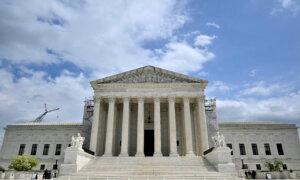Non-black voters contested the redistricting plan that added an extra black-majority district, saying it was racially discriminatory.
The state of Louisiana and a bloc of black voters asked the Supreme Court on July 30 to uphold an election map that created a second black-majority congressional district in Louisiana.
Louisiana previously argued in court papers that abandoning the map months before this year’s elections would cause “chaos.”
In the order two months ago, the nation’s highest court left open the question of whether it would reverse a lower court order that overturned the map.
The Supreme Court’s eventual decision in the case will have nationwide political ramifications given the Republicans’ wafer-thin majority in the U.S. House of Representatives. Louisiana is home to Speaker Mike Johnson and House Majority Leader Steve Scalise, both Republicans.
Louisiana currently has six electoral districts in the U.S. House. Five of those six seats are now held by Republicans. Republicans occupy both U.S. Senate seats.
The map in dispute was drawn up by the Republican-controlled Louisiana Legislature under a June 2022 order from Judge Shelly Dick of the U.S. District Court for the Middle District of Louisiana. She made a preliminary finding that the original map, which provided for one black-majority congressional district in the state, likely discriminated against black voters who comprise nearly one-third of the state’s population.
The judge ordered the Legislature to create a second black-majority district to comply with Section 2 of the federal Voting Rights Act. Section 2 forbids voting practices or procedures that discriminate on the basis of race, color, or membership in a large language minority group.
In January of this year, the Legislature approved a map that included the two black-majority districts.
The new court filings followed the Supreme Court’s May 15 order that blocked an April 30 ruling by a divided three-member panel of federal judges in the Western District of Louisiana.
The panel determined that the map could not be used in upcoming elections because it unconstitutionally disfavored non-black voters. The panel said in its order, which was put on hold by the Supreme Court, that a new map would have to be drawn by June 3.
Robinson said in the document that failing to reverse the panel’s ruling would limit state legislatures’ options when attempting to comply with federal law.
The decision “will further inject the federal courts into the redistricting process and deprive states of the necessary flexibility to take account of other legislative priorities when they act to remedy identified violations of [Section] 2 [of the Voting Rights Act],” the document stated.
The respondents, who oppose the map, are non-black voters led by voter Phillip Callais.
Callais said in previously filed court papers that the map featuring two black-majority districts unlawfully discriminated against non-black voters.
The map “engaged in explicit, racial segregation of voters,” he said.
Redistricting is supposed to be done by legislatures, not by courts, the state argued in its filing.
The panel here failed to “exercise extraordinary caution” in adjudicating the claim that the state drew the lines of electoral districts on a racial basis, and its judgment should be reversed, the document said.
The statement did not appear in the Supreme Court’s docket at the time of publication, but Louisiana Solicitor General Benjamin Aguiñaga confirmed it was filed with the court and emailed The Epoch Times a copy of the document.
Aguiñaga was asked for a comment on the case but did not provide one.
The Epoch Times reached out to Callais’s attorney, Edward Greim of Graves Garrett in Kansas City, Missouri, for comment but received no reply by publication time.
It is unclear when the Supreme Court will act on the new court filings.
Original News Source Link – Epoch Times
Running For Office? Conservative Campaign Consulting – Election Day Strategies!


